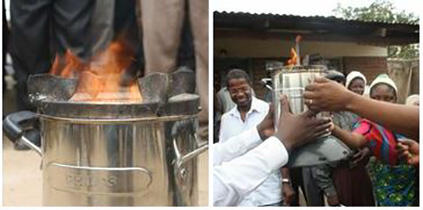
A key partner in the Cooking and Pneumonia Study (CAPS) has been shortlisted for a prestigious environmental award in the UK.
African Clean Energy (ACE), who has built an industrial scale manufacturing plant in Lesotho as a joint venture with Philips to produce the advanced cookstoves used in the study, is one of the 25 projects shortlisted in the International category of the Ashden Awards 2014. The awards were founded in 2001 to uncover and reward sustainable energy champions around the world that are cutting carbon, protecting the environment, reducing poverty and improving people’s lives.
ACE is among 61 different projects from 17 countries that have been shortlisted in four different categories. It is a family run company based in Lesotho who has specialised in the production of the ultra-clean biomass cookstoves with support from Royal Philips Electronics and the South African Industrial Development Corporation (IDC).
The cookstoves have been designed to be fuelled by wood, dung and other biomass, and burn fuel more efficiently. This means that wood needs to be collected only once a week instead of every day as well as reducing the smoke emitted by around 90% in comparison to traditional open fires, which is key in relation to CAPS.
CAPS started in earnest before Christmas, and will see 150 villages take part in what is the largest study of its kind. In total 10,000 cookstoves will be delivered for the randomised trial which will take place over two years and investigate the impact of advanced cookstove intervention to prevent pneumonia in children under five in Malawi, a major cause of death in this age group.
The study was recently awarded £2.7 million by the Joint Global Health Trials Scheme, a partnership of the UK Department for International Development (DFID), the Medical Research Council (MRC) and the Wellcome Trust.
Co-Principal Investigator Dr Kevin Mortimer, a Senior Clinical Lecturer at LSTM and a Respiratory Consultant at Liverpool’s Aintree University Hospital said: “Through our partnership with ACE we will have a secure source of the Philips cookstove for the trial. The locally relevant business knowledge that ACE brings, together with the planned economic and qualitative work, will help to plan the up-scaling of the intervention if indicated in the future. ACE has committed to provide these stoves at the lowest possible cost for the trial and up-scaling.”
Finalists for each award category will be announced in early April, with awards to be presented at a ceremony at the Royal Geographical Society in London in May. The winners receive a cash prize of between £5,000 and £40,000, a platform to promote their work and tailored support to grow even further.